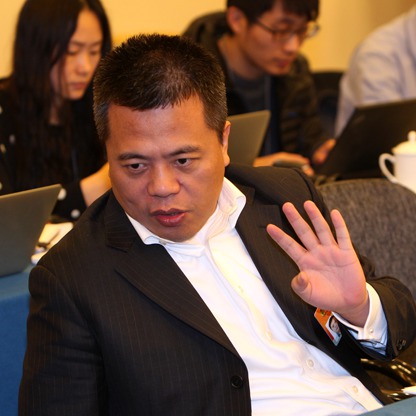China's player looks to the big game
Entertainment chief's raid could make him leading online contender
China's second-richest man, Chen Tianquiao,

looks poised to become the country's leading new media player after staging the sector's first aggressive raid on a rival's shares.
In a stealthy swoop over the spring festival holiday, Mr Chen's online game company Shanda Interactive Entertainment bought a 19.5% stake in Sina Corp, China's leading internet news portal, for $196m (£102m). The move finally turned the tables on Sina, which had tried to buy Shanda in 2003.
The possibility of a takeover that would create China's biggest internet company with a combined value of $5bn, has sent shock waves through the new media sector, which analysts said is ripe for consolidation.
The raid also highlights the ambitions of Chen, who has made no secret of his desire to compete with the executive he most admires, Bill Gates.
Until recently, such aspirations looked unlikely to be realised. The 31-year-old Communist Party member listed Shanda in 2003. Its success in securing a peak domestic market of 2 million game players was built on its game Legend of Mir II, which was developed in South Korea. Last November, Chen told The Guardian that he had never travelled overseas.
Yet the acquisition of the stake in Sina, which operates China's most influential online news portal as well as the country's biggest mobile messaging service, was an international counter-attack that would have made the most cunning multinational executive proud.
After Sina's 2003 attempt to buy Shanda, Chen first tried to turn the tables last October with a friendly takeover offer. The Sina board, led by the politically influential French-educated chief executive Wang Yan, reportedly refused to meet him.
Chen retaliated with a secret strategy that became known inside Shanda as the "lightning plan". According to the 21st Century business newspaper, Shanda registered four companies in the British Virgin islands which helped to make the purchases without setting off alarm bells. To minimise the risk of discovery, the bulk of the acquisitions were made on the Nasdaq stock exchange in New York on February 7 and 8 - either side of the Chinese new year, when Sina's top executives were on holiday.
A week later the four Virgin Islands companies signed an agreement to hold the Sina shares in the name of Shanda. Soon after, Chen made his first trip overseas, to register his position as a major shareholder with the American financial regulator, the securities and exchange commission, in New York.
His visit to the States may have reaped other important benefits. The Sohu.com news portal reported that Chen reached agreement with enough American institutional investors to be close to securing a further 20% of Sina.
He is also said to have met Masayoshi Son, the founder of Softbank, Japan's biggest internet company, and Bill Gates. According to the domestic media, Chen agreed to help Microsoft promote its X-Box games console in China.
But a takeover is far from assured. Last week, Sina belatedly tried to ward off further purchases by offering its shareholders new stock at half the market price. This "poison pill" defence is designed to dilute the influence of an aggressor and make an acquisition prohibitively expensive.
Although Shanda's profits rose 19% in the last quarter to hit 130m yuan (£8.2m) analysts believe Chen lacks the funds to complete an aggressive takeover.
This may no longer be necessary. Chen appears to have outmanoeuvred Wang, who can no longer ignore his rival. Sina's stock is scattered among individual shareholders, which makes it unusually vulnerable to a bid.
The Chinese government, which is used to state central planning, may also find it difficult to ignore the positive aspects of this capitalist raid on international markets. Shanda's move could pre-empt an often-predicted takeover of Sina by Yahoo, which would swallow it up into a larger American-owned empire.
Instead, a tie-up linking China's leading generators of internet games, advertising and messaging revenues could be a step towards the creation of a global player. Analysts say further consolidation is probable, with games operators likely to hold the upper hand.
"The bid underlines the increasing level of cross-media activity in China and the driving power of games in the online and mobile arenas. Watch this space," said Jeanne-Marie Gescher of CGA, a media consultancy in China.
It also takes Chen a step closer to his ambition of creating an online "info-entertainment" company able to challenge anything in the world. The 21st Century business daily carried extracts of a letter it said the Shanda chief sent to a friend after meeting Mr Gates.
Writing in the third person, Chen reportedly stated his plans for a company built around what he calls ICTE - information, communication, technology and entertainment.
"Now that the richest Chinese man has met the richest man in the world," the letter said, "his ambition has become clear: it is to compete and I think ICTE is the way to realise that dream."

No comments:
Post a Comment
Comments always welcome!